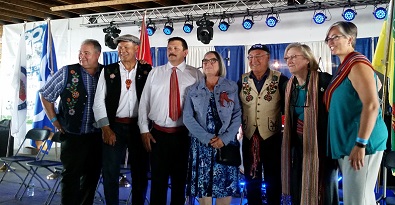Metis leaders from across Canada pictures with Minister Carolyn Bennett. Photo by Chelsea Laskowski.
Metis people from across Canada have pulled out their sashes for the Back to Batoche festival.
Some passionate speeches during the opening ceremonies on Friday touched on the resilience and grit of Metis people shown at Batoche and during other historic clashes as Canada and Hudson’s Bay Company aimed to take over what Metis National Council President Clement Chartier calls their “homeland.”
He addressed many elements for Metis people that have changed since last year’s Back to Batoche, such as a pending report by Tom Isaac about Metis rights. The repost is meant to act as a blueprint for how governments work with Metis people in the future.
The Supreme Court ruling on the Daniels Case, which includes Metis people under the federal government’s Indian Act responsibilities, was another big step forward this year, Chartier said.
The Manitoba Metis Federation have also signed a memorandum of understanding with the federal government “which is going to lay the path forward for resolution of that long-outstanding claim, basically since 1870,” he said.
For Robert Doucette, this is his last Back to Batoche as president of the Metis Nation Saskatchewan. He thanked his wife Betty during his speech.
“For me, Batoche is about family. That’s why we come back. It isn’t about proclamations or pronouncements of what government is doing for us, it’s about family. It’s about our survival as a people,” he said.
Doucette apologized for crying as his speech got emotional due to the recent loss of a granddaughter.
Indigenous and Northern Affairs Minister Carolyn Bennett spoke to the crowd of Metis people, after waking early for a pipe ceremony and canoe trip with youths from La Loche during a beautiful morning along the South Saskatchewan River, which is a few kilometres away from the Batoche site. They canoed in groups of five for about three hours, and talked about Metis history along the way.
This isn’t Bennett’s first time attending Back to Batoche, but “as a few people have pointed out to me today things are a bit different than the last time I was here,” she said, referring to her change in role from Opposition member to Minister of Indigenous and Northern Affairs. The comment got widespread applause.
There are many things that stay consistent, such as hospitality and friendship, Bennett said.
“You understand why people come together to establish their roots and strengthen their relationships,” she said in an interview afterwards.
Joanna Blondeau. Photo by Chelsea Laskowski
Back to Batoche is a time for Metis people to look back at their heritage. For Joanna Blondeau, the Riel Resistance of 1885 holds a deep meaning.
Her great-grandfather’s family was from Batoche and Blondeau said he ended up imprisoned along with Louis Riel afterwards.
He caught a fatal bout of pneumonia while serving five years in Stony Mountains.
The family moved south afterwards, but Blondeau still attends the festival every year that she can.

